|
|
|
|
|
|
|
|
|
|
|
|
 We’re going to point to colors in the rainbow. Can you…
|
|
|
|
|
|
|
|
|
|
|
|
|
|
|
|
|
|
|
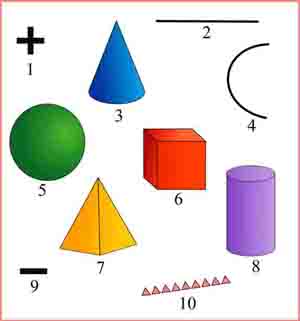 Look at all the shapes below. Can you point to the…
|
|
|
|
|
|
|
|
|
|
|
|
|
|
|
|
|
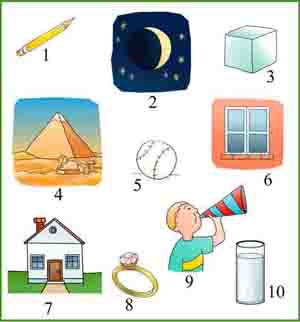 Look at all the objects below. They resemble shapes you know. Point to an object that resembles a…
|
|
|
|
|
|
|
|
|
|
|
|
|
|
|
|
|
|
|
|
|
|
|
|
|
|
|
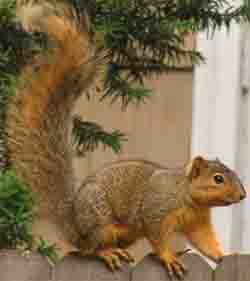 The Interesting Life of squirrels The Interesting Life of squirrels
1 Squirrels are rodents that are indigenous to the Americas, Eurasia, and Africa, and have been introduced to Australia. There are 280 different species of squirrels among which ground squirrels, tree squirrels, chipmunks, flying squirrels, marmots and prairie dogs.
2 Squirrels are born blind and have perfect vision as adults. They can have two to eight babies (called kittens) at once. The kittens depend on their mother for food and drink for a couple of months before they become mature enough to find food for themselves. When squirrels decide to mate, they look for nests. Before that, they live in the holes of trunks or in the treetop.
3 Everyone knows that squirrels love nuts but the other things they like eating are roots, tree bark, small insects, leaves and acorns. Squirrels gather and save their food through the whole year but mostly in the autumn. This way they get ready for the winter. The squirrels bury their food, then hibernate in winter and when they wake up out of hibernation they go look for the food they buried.
4 Squirrels vary in size and color. The smallest representative of the family is the African pygmy squirrel which is about 10 centimeters long and the biggest one is the Alpine Marmot which could size up to 73 centimeters. Some of them have grey, brown or black fur and others have white stripes. But they all have big eyes, bushy tails, chunky front teeth and long nails and claws so that they can easily climb up trees.
5 Squirrels can jump up to 4 to 5 feet vertically, and they can leap 8 to 10 feet between objects. The flying squirrels can’t fly like birds but they can glide between trees for distances of up to 90 meters (295 ft.), which is amazing taking into consideration their size.
|
|
|
|
|
|
|
|
|
 Egypt and its River
by Edith A. How, B.A. Egypt and its River
by Edith A. How, B.A.
1 Egypt is a country in the north of Africa. It has sea to the north and sea to the east. On the north it is called the Mediterranean Sea, and on the east the Red Sea. On the west is the great sandy desert called the Sahara, and to the south are great forests and mountains.
2 Egypt itself is the land of the great River Nile. There is very seldom any rain there, and everyone has to get water from the great river. So all the people live near the Nile or the canals that lead out of it. A "canal" is a waterway, the channel of which has been dug by men. The big towns are where the river flows out into the sea, or where a canal meets the main stream, because the people bring their merchandise to market in boats.
3 All over the land are little villages, where many people live and work in the fields to grow food. Year by year when there is heavy rain in the mountains far away south, the River Nile rises and floods the fields. Then the people plant their seed quickly and get a good harvest. It is not difficult to understand why the egyptians love their great river, which gives them water for their fields and carrys them in their boats from place to place.
|
|
|
|
|
|
|
|
|
|
|
|
|
|
|
Read “The Ant and the Grasshopper” and “The Bear and the Two Travelers” and answer the questions that follow.
The Ant and the Grasshopper
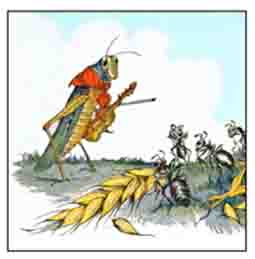
In a field one summer's day a Grasshopper was hopping about, chirping and singing to its heart's content. An Ant passed by,
bearing along with great toil an ear of corn he was taking to the nest.
"Why not come and chat with me," said the Grasshopper, "instead of toiling and moiling in that way?"
"I am helping to lay up food for the winter," said the Ant, "and recommend you to do the same."
"Why bother about winter?" said the Grasshopper; we have got plenty of food at present."
But the Ant went on its way and continued its toil.
When the winter came the Grasshopper had no food and found itself dying of hunger, while it saw the ants distributing every day corn and grain from the stores they had collected in the summer. Then the Grasshopper knew:
It is best to prepare for the days of need.
|
The Bear and the Two Travelers
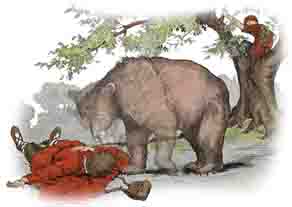
TWO MEN were traveling together, when a Bear suddenly met them on their path. One of them climbed up quickly into a tree and concealed himself in the branches. The other, seeing that he must be attacked, fell flat on the ground, and when the Bear came up and felt him with his snout, and smelt him all over, he held his breath, and feigned the appearance of death as much as he could.
The Bear soon left him, for it is said he will not touch a dead body. When he was quite gone, the other Traveler descended from the tree, and jocularly inquired of his friend what it was the Bear had whispered in his ear. "He gave me this advice," his companion replied.
"Never travel with a friend who
deserts you at the approach of danger."
|
|
|
|
|
|
|
|
|
|
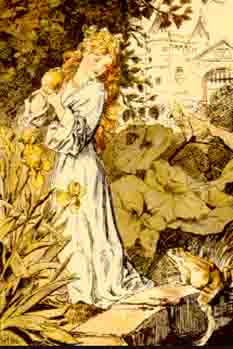 Read “The Frog-Prince” and answer the questions that follow.
THE FROG-PRINCE, by The Brothers Grimm Read “The Frog-Prince” and answer the questions that follow.
THE FROG-PRINCE, by The Brothers Grimm
One fine evening a young princess put on her bonnet and clogs, and went out to take a walk by herself in a wood; and when she came to a cool spring of water, that rose in the midst of it, she sat herself down to rest a while. Now she had a golden ball in her hand, which was her favourite plaything; and she was always tossing it up into the air, and catching it again as it fell. After a time she threw it up so high that she missed catching it as it fell; and the ball bounded away, and rolled along upon the ground, till at last it fell down into the spring. The princess looked into the spring after her ball, but it was very deep, so deep that she could not see the bottom of it. Then she began to bewail her loss, and said, 'Alas! if I could only get my ball again, I would give all my fine clothes and jewels, and everything that I have in the world.'
Whilst she was speaking, a frog put its head out of the water, and said, 'Princess, why do you weep so bitterly?' 'Alas!' said she, 'what can you do for me, you nasty frog? My golden ball has fallen into the spring.' The frog said, 'I want not your pearls, and jewels, and fine clothes; but if you will love me, and let me live with you and eat from off your golden plate, and sleep upon your bed, I will bring you your ball again.' 'What nonsense,' thought the princess, 'this silly frog is talking! He can never even get out of the spring to visit me, though he may be able to get my ball for me, and therefore I will tell him he shall have what he asks.' So she said to the frog, 'Well, if you will bring me my ball, I will do all you ask.' Then the frog put his head down, and dived deep under the water; and after a little while he came up again, with the ball in his mouth, and threw it on the edge of the spring. As soon as the young princess saw her ball, she ran to pick it up; and she was so overjoyed to have it in her hand again, that she never thought of the frog, but ran home with it as fast as she could. The frog called after her, 'Stay, princess, and take me with you as you said,' But she did not stop to hear a word.
The next day, just as the princess had sat down to dinner, she heard a strange noise—tap, tap—plash, plash—as if something was coming up the marble staircase: and soon afterwards there was a gentle knock at the door, and a little voice cried out and said:
'Open the door, my princess dear,
Open the door to thy true love here!
And mind the words that thou and I said
By the fountain cool, in the greenwood shade.'
Then the princess ran to the door and opened it, and there she saw the frog, whom she had quite forgotten. At this sight she was sadly frightened, and shutting the door as fast as she could came back to her seat. The king, her father, seeing that something had frightened her, asked her what was the matter. 'There is a nasty frog,' said she, 'at the door, that lifted my ball for me out of the spring this morning: I told him that he should live with me here, thinking that he could never get out of the spring; but there he is at the door, and he wants to come in.'
While she was speaking the frog knocked again at the door, and said:
'Open the door, my princess dear,
Open the door to thy true love here!
And mind the words that thou and I said
By the fountain cool, in the greenwood shade.'
Then the king said to the young princess, 'As you have given your word you must keep it; so go and let him in.' She did so, and the frog hopped into the room, and then straight on—tap, tap—plash, plash—from the bottom of the room to the top, till he came up close to the table where the princess sat. 'Pray lift me upon chair,' said he to the princess, 'and let me sit next to you.' As soon as she had done this, the frog said, 'Put your plate nearer to me, that I may eat out of it.' This she did, and when he had eaten as much as he could, he said, 'Now I am tired; carry me upstairs, and put me into your bed.' And the princess, though very unwilling, took him up in her hand, and put him upon the pillow of her own bed, where he slept all night long. As soon as it was light he jumped up, hopped downstairs, and went out of the house. 'Now, then,' thought the princess, 'at last he is gone, and I shall be troubled with him no more.'
But she was mistaken; for when night came again she heard the same tapping at the door; and the frog came once more, and said:
'Open the door, my princess dear,
Open the door to thy true love here!
And mind the words that thou and I said
By the fountain cool, in the greenwood shade.'
And when the princess opened the door the frog came in, and slept upon her pillow as before, till the morning broke. And the third night he did the same. But when the princess awoke on the following morning she was astonished to see, instead of the frog, a handsome prince, gazing on her with the most beautiful eyes she had ever seen, and standing at the head of her bed.
He told her that he had been enchanted by a spiteful fairy, who had changed him into a frog; and that he had been fated so to abide till some princess should take him out of the spring, and let him eat from her plate, and sleep upon her bed for three nights. 'You,' said the prince, 'have broken his cruel charm, and now I have nothing to wish for but that you should go with me into my father's kingdom, where I will marry you, and love you as long as you live.'
The young princess, you may be sure, was not long in saying 'Yes' to all this; and as they spoke a gay coach drove up, with eight beautiful horses, decked with plumes of feathers and a golden harness; and behind the coach rode the prince's servant, faithful Heinrich, who had bewailed the misfortunes of his dear master during his enchantment so long and so bitterly, that his heart had well-nigh burst.
They then took leave of the king, and got into the coach with eight horses, and all set out, full of joy and merriment, for the prince's kingdom, which they reached safely; and there they lived happily a great many years.
|
|
|
|
|
|
|
|
|
|
|
|
|
|
|
|
|
|
|
|
|
|
|
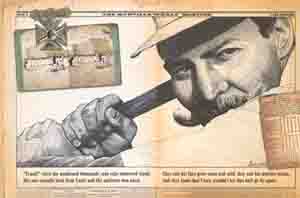 “Casey at the Bat” “Casey at the Bat”
written by Ernest Lawrence Thayer in 1888
The outlook wasn't brilliant for the Mudville nine that day;
The score stood four to two, with but one inning more to play,
And then when Cooney died at first, and Barrows did the same,
A pall-like silence fell upon the patrons of the game.
A straggling few got up to go in deep despair. The rest
Clung to that hope which springs eternal in the human breast;
They thought, "If only Casey could but get a whack at that--
We'd put up even money now, with Casey at the bat."
But Flynn preceded Casey, as did also Jimmy Blake,
And the former was a hoodoo, while the latter was a cake;
So upon that stricken multitude grim melancholy sat,
For there seemed but little chance of Casey getting to the bat.
But Flynn let drive a single, to the wonderment of all,
And Blake, the much despisèd, tore the cover off the ball;
And when the dust had lifted, and men saw what had occurred,
There was Jimmy safe at second and Flynn a-hugging third.
Then from five thousand throats and more there rose a lusty yell;
It rumbled through the valley, it rattled in the dell;
It pounded on the mountain and recoiled upon the flat,
For Casey, mighty Casey, was advancing to the bat.
There was ease in Casey's manner as he stepped into his place;
There was pride in Casey's bearing and a smile lit Casey's face.
And when, responding to the cheers, he lightly doffed his hat,
No stranger in the crowd could doubt 'twas Casey at the bat.
Ten thousand eyes were on him as he rubbed his hands with dirt;
Five thousand tongues applauded when he wiped them on his shirt;
Then while the writhing pitcher ground the ball into his hip,
Defiance flashed in Casey's eye, a sneer curled Casey's lip.
And now the leather-covered sphere came hurtling through the air,
And Casey stood a-watching it in haughty grandeur there.
Close by the sturdy batsman the ball unheeded sped--
"That ain't my style," said Casey. "Strike one!" the umpire said.
From the benches, black with people, there went up a muffled roar,
Like the beating of the storm-waves on a stern and distant shore;
"Kill him! Kill the umpire!" shouted some one on the stand;
And it's likely they'd have killed him had not Casey raised his hand.
With a smile of Christian charity great Casey's visage shone;
He stilled the rising tumult; he bade the game go on;
He signaled to the pitcher, and once more the dun sphere flew;
But Casey still ignored it, and the umpire said, "Strike two!"
"Fraud!" cried the maddened thousands, and echo answered "Fraud!"
But one scornful look from Casey and the audience was awed.
They saw his face grow stern and cold, they saw his muscles strain,
And they knew that Casey wouldn't let that ball go by again.
The sneer has fled from Casey's lip, his teeth are clenched in hate;
He pounds with cruel violence his bat upon the plate.
And now the pitcher holds the ball, and now he lets it go.
And now the air is shattered by the force of Casey's blow.
Oh, somewhere in this favored land the sun is shining bright;
The band is playing somewhere, and somewhere hearts are light,
And somewhere men are laughing, and little children shout;
But there is no joy in Mudville--great Casey has struck out.
|
|
|
|
|
|
|
|
|
|
|
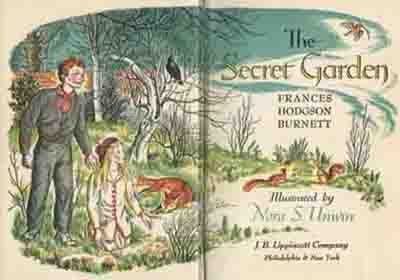 The following excerpt was taken from the book The Secret Garden, written by Frances Hodgson Burnett. The following excerpt was taken from the book The Secret Garden, written by Frances Hodgson Burnett.
When Mary Lennox was sent to Misselthwaite Manor to live with her uncle everybody said she was the most disagreeable-looking child ever seen. It was true, too. She had a little thin face and a little thin body, thin light hair and a sour expression. Her hair was yellow. Her face was yellow, too, because she had been born in India and had always been ill in one way or another. Her father had held a position under the English Government and had always been busy and ill himself. Her mother had been a great beauty who cared only to go to parties and amuse herself. She had not wanted a little girl at all. When Mary was born she handed her over to the care of an Ayah, who was made to understand that if she wished to please the Mem Sahib she must keep the child out of sight as much as possible.
So when she was a sickly, fretful, ugly little baby she was kept out of the way. When she became a sickly, fretful, toddling thing she was kept out of the way also. She never remembered seeing familiarly anything but the dark faces of her Ayah and the other native servants. Because they always obeyed her and gave her her own way in everything, by the time she was six years old she was as tyrannical and selfish a little pig as ever lived. The young English governess who came to teach her to read and write disliked her so much that she gave up her place in three months. When other governesses came to try to fill it they always went away in a shorter time than the first one. So if Mary had not chosen to really want to know how to read books she would never have learned her letters at all.
One frightfully hot morning, when she was about nine years old, she awakened feeling very cross. She became crosser still when she saw that the servant who stood by her bedside was not her Ayah.
"Why did you come?" she said to the strange woman. "I will not let you stay. Send my Ayah to me."
The woman looked frightened, but she only stammered that the Ayah could not come. When Mary threw herself into a passion and beat and kicked her, she looked only more frightened and repeated that it was not possible for the Ayah to come to Missie Sahib.
There was something mysterious in the air that morning. Nothing was done in its regular order. Several of the native servants seemed missing, while those whom Mary saw slunk or hurried about with ashy and scared faces. But no one would tell her anything and her Ayah did not come. She was actually left alone as the morning went on. At last she wandered out into the garden and began to play by herself under a tree near the veranda. She pretended that she was making a flower-bed. She stuck big scarlet hibiscus blossoms into little heaps of earth. The entire time she was growing more and more angry and muttering to herself the things she would say and the names she would call Saidie when she returned.
|
|
|
|
|
|
|
|
|
|
|
|
|
|
|
|
|
|
|
|
|
|
|
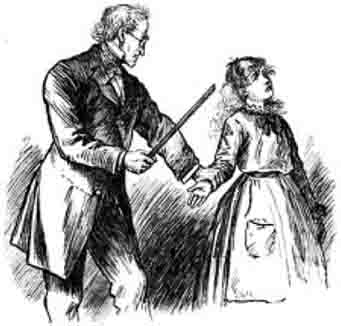 Little Women
by Louisa May Alcott Little Women
by Louisa May Alcott
"Tell me all about it. Are limes the fashion now? It used to be pricking bits of rubber to make balls." And Meg tried to keep her countenance, Amy looked so grave and important.
"Why, you see, the girls are always buying them, and unless you want to be thought mean, you must do it too. It's nothing but limes now, for everyone is sucking them in their desks in schooltime, and trading them off for pencils, bead rings, paper dolls, or something else, at recess. If one girl likes another, she gives her a lime. If she's mad with her, she eats one before her face, and doesn't offer even a suck. They treat by turns, and I've had ever so many but haven't returned them, and I ought for they are debts of honor, you know."
* * * *
Next day Amy was rather late at school, but could not resist the temptation of displaying, with pardonable pride, a moist brown-paper parcel, before she consigned it to the inmost recesses of her desk. During the next few minutes the rumor that Amy March had got twenty-four delicious limes (she ate one on the way) and was going to treat circulated through her 'set', and the attentions of her friends became quite overwhelming. Katy Brown invited her to her next party on the spot. Mary Kingsley insisted on lending her her watch till recess, and Jenny Snow, a satirical young lady, who had basely twitted Amy upon her limeless state, promptly buried the hatchet and offered to furnish answers to certain appalling sums. But Amy had not forgotten Miss Snow's cutting remarks about 'some persons whose noses were not too flat to smell other people's limes, and stuck-up people who were not too proud to ask for them', and she instantly crushed 'that Snow girl's' hopes by the withering telegram, "You needn't be so polite all of a sudden, for you won't get any."
A distinguished personage happened to visit the school that morning, and Amy's beautifully drawn maps received praise, which honor to her foe rankled in the soul of Miss Snow, and caused Miss March to assume the airs of a studious young peacock. But, alas, alas! Pride goes before a fall, and the revengeful Snow turned the tables with disastrous success. No sooner had the guest paid the usual stale compliments and bowed himself out, than Jenny, under pretense of asking an important question, informed Mr. Davis, the teacher, that Amy March had pickled limes in her desk…
"Young ladies, attention, if you please!"
At the stern order the buzz ceased, and fifty pairs of blue, black, gray, and brown eyes were obediently fixed upon his awful countenance.
"Miss March, come to the desk."
Amy rose to comply with outward composure, but a secret fear oppressed her, for the limes weighed upon her conscience.
"Bring with you the limes you have in your desk," was the unexpected command which arrested her before she got out of her seat.
"Don't take all." whispered her neighbor, a young lady of great presence of mind.
Amy hastily shook out half a dozen and laid the rest down before Mr. Davis, feeling that any man possessing a human heart would relent when that delicious perfume met his nose. Unfortunately, Mr. Davis particularly detested the odor of the fashionable pickle, and disgust added to his wrath.
"Is that all?"
"Not quite," stammered Amy.
"Bring the rest immediately."
With a despairing glance at her set, she obeyed.
"You are sure there are no more?"
"I never lie, sir."
"So I see. Now take these disgusting things two by two, and throw them out of the window."
There was a simultaneous sigh, which created quite a little gust, as the last hope fled, and the treat was ravished from their longing lips. Scarlet with shame and anger, Amy went to and fro six dreadful times, and as each doomed couple, looking oh, so plump and juicy, fell from her reluctant hands, a shout from the street completed the anguish of the girls, for it told them that their feast was being exulted over by the little Irish children, who were their sworn foes. This -- this was too much. All flashed indignant or appealing glances at the inexorable Davis, and one passionate lime lover burst into tears.
As Amy returned from her last trip, Mr. Davis gave a portentous "Hem!" and said, in his most impressive manner . . .
"Young ladies, you remember what I said to you a week ago. I am sorry this has happened, but I never allow my rules to be infringed, and I never break my word. Miss March, hold out your hand."
Amy started, and put both hands behind her, turning on him an imploring look which pleaded for her better than the words she could not utter. She was rather a favorite with 'old Davis', as, of course, he was called, and it's my private belief that he would have broken his word if the indignation of one irrepressible young lady had not found vent in a hiss. That hiss, faint as it was, irritated the irascible gentleman, and sealed the culprit's fate.
"Your hand, Miss March!" was the only answer her mute appeal received, and too proud to cry or beseech, Amy set her teeth, threw back her head defiantly, and bore without flinching several tingling blows on her little palm. They were neither many nor heavy, but that made no difference to her. For the first time in her life she had been struck, and the disgrace, in her eyes, was as deep as if he had knocked her down.
"You will now stand on the platform till recess," said Mr. Davis, resolved to do the thing thoroughly, since he had begun.
That was dreadful. It would have been bad enough to go to her seat, and see the pitying faces of her friends, or the satisfied ones of her few enemies, but to face the whole school, with that shame fresh upon her, seemed impossible, and for a second she felt as if she could only drop down where she stood, and break her heart with crying. A bitter sense of wrong and the thought of Jenny Snow helped her to bear it, and, taking the ignominious place, she fixed her eyes on the stove funnel above what now seemed a sea of faces, and stood there, so motionless and white that the girls found it hard to study with that pathetic figure before them.
During the fifteen minutes that followed, the proud and sensitive little girl suffered a shame and pain which she never forgot. To others it might seem a ludicrous or trivial affair, but to her it was a hard experience, for during the twelve years of her life she had been governed by love alone, and a blow of that sort had never touched her before. The smart of her hand and the ache of her heart were forgotten in the sting of the thought, "I shall have to tell at home, and they will be so disappointed in me!"
The fifteen minutes seemed an hour, but they came to an end at last, and the word 'Recess!' had never seemed so welcome to her before.
****
"Yes, you can have a vacation from school, but I want you to study a little every day with Beth," said Mrs. March that evening. "I don't approve of corporal punishment, especially for girls. I dislike Mr. Davis's manner of teaching and don't think the girls you associate with are doing you any good, so I shall ask your father's advice before I send you anywhere else."
"That's good! I wish all the girls would leave, and spoil his old school. It's perfectly maddening to think of those lovely limes," sighed Amy, with the air of a martyr.
"I am not sorry you lost them, for you broke the rules, and deserved some punishment for disobedience," was the severe reply, which rather disappointed the young lady, who expected nothing but sympathy.
"Do you mean you are glad I was disgraced before the whole school?" cried Amy.
"I should not have chosen that way of mending a fault," replied her mother, "but I'm not sure that it won't do you more good than a milder method. You are getting to be rather conceited, my dear, and it is quite time you set about correcting it. You have a good many little gifts and virtues, but there is no need of parading them, for conceit spoils the finest genius. There is not much danger that real talent or goodness will be overlooked long, even if it is, the consciousness of possessing and using it well should satisfy one, and the great charm of all power is modesty."
|
|
|
|
|
|
|
|
|
|
|
|
|
|
|
|
|
|
|
|
|
|
|
|
|
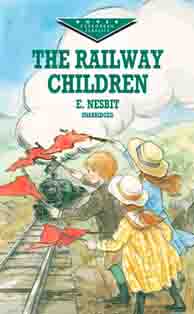 Excerpt from THE RAILWAY CHILDREN Excerpt from THE RAILWAY CHILDREN
Chapter I. The beginning of things.
By E. Nesbit
They were not railway children to begin with. I don't suppose they had ever thought about railways except as a means of getting to Maskelyne and Cook's, the Pantomime, Zoological Gardens, and Madame Tussaud's. They were just ordinary suburban children, and they lived with their Father and Mother in an ordinary red-brick-fronted villa, with coloured glass in the front door, a tiled passage that was called a hall, a bath-room with hot and cold water, electric bells, French windows, and a good deal of white paint, and 'every modern convenience', as the house-agents say.
There were three of them. Roberta was the eldest. Of course, Mothers never have favourites, but if their Mother HAD had a favourite, it might have been Roberta. Next came Peter, who wished to be an Engineer when he grew up; and the youngest was Phyllis, who meant extremely well.
Mother did not spend all her time in paying dull calls to dull ladies, and sitting dully at home waiting for dull ladies to pay calls to her. She was almost always there, ready to play with the children, and read to them, and help them to do their home-lessons. Besides this she used to write stories for them while they were at school, and read them aloud after tea, and she always made up funny pieces of poetry for their birthdays and for other great occasions, such as the christening of the new kittens, or the refurnishing of the doll's house, or the time when they were getting over the mumps.
These three lucky children always had everything they needed: pretty clothes, good fires, a lovely nursery with heaps of toys, and a Mother Goose wall-paper. They had a kind and merry nursemaid, and a dog who was called James, and who was their very own. They also had a Father who was just perfect—never cross, never unjust, and always ready for a game—at least, if at any time he was NOT ready, he always had an excellent reason for it, and explained the reason to the children so interestingly and funnily that they felt sure he couldn't help himself.
You will think that they ought to have been very happy. And so they were, but they did not know HOW happy till the pretty life in the Red Villa was over and done with, and they had to live a very different life indeed.
The dreadful change came quite suddenly.
Peter had a birthday—his tenth. Among his other presents was a model engine more perfect than you could ever have dreamed of. The other presents were full of charm, but the Engine was fuller of charm than any of the others were.
Its charm lasted in its full perfection for exactly three days. Then, owing either to Peter's inexperience or Phyllis's good intentions, which had been rather pressing, or to some other cause, the Engine suddenly went off with a bang. James was so frightened that he went out and did not come back all day. All the Noah's Ark people who were in the tender were broken to bits, but nothing else was hurt except the poor little engine and the feelings of Peter. The others said he cried over it—but of course boys of ten do not cry, however terrible the tragedies may be which darken their lot. He said that his eyes were red because he had a cold. This turned out to be true, though Peter did not know it was when he said it, the next day he had to go to bed and stay there. Mother began to be afraid that he might be sickening for measles, when suddenly he sat up in bed and said:
"I hate gruel—I hate barley water—I hate bread and milk. I want to get up and have something REAL to eat."
"What would you like?" Mother asked.
"A pigeon-pie," said Peter, eagerly, "a large pigeon-pie. A very large one."
So Mother asked the Cook to make a large pigeon-pie. The pie was made. And when the pie was made, it was cooked. And when it was cooked, Peter ate some of it. After that his cold was better. Mother made a piece of poetry to amuse him while the pie was being made. It began by saying what an unfortunate but worthy boy Peter was, then it went on:
He had an engine that he loved
With all his heart and soul,
And if he had a wish on earth
It was to keep it whole.
One day—my friends, prepare your minds;
I'm coming to the worst—
Quite suddenly a screw went mad,
And then the boiler burst!
With gloomy face he picked it up
And took it to his Mother,
Though even he could not suppose
That she could make another;
For those who perished on the line
He did not seem to care,
His engine being more to him
Than all the people there.
And now you see the reason why
Our Peter has been ill:
He soothes his soul with pigeon-pie
His gnawing grief to kill.
He wraps himself in blankets warm
And sleeps in bed till late,
Determined thus to overcome
His miserable fate.
And if his eyes are rather red,
His cold must just excuse it:
Offer him pie; you may be sure
He never will refuse it.
|
|
|
|
|
|
|
|
|
|
|
|
|
|
|
|
|
|
|
|
|
|
|
|
|
Read “Stopping by Woods on a Snowy Evening” and “Ah Sunflower” and answer the questions that follow.
Stopping by Woods on a Snowy Evening
By: Robert Frost
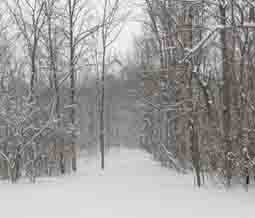
Whose woods these are I think I know.
His house is in the village, though;
He will not see me stopping here
To watch his woods fill up with snow.
My little horse must think it queer
To stop without a farmhouse near
Between the woods and frozen lake
The darkest evening of the year.
He gives his harness bells a shake
To ask if there is some mistake.
The only other sound's the sweep
Of easy wind and downy flake.
The woods are lovely, dark, and deep,
But I have promises to keep,
And miles to go before I sleep,
And miles to go before I sleep.
|
Ah Sunflower
By: William Blake

Ah Sunflower, weary of time,
Who countest the steps of the sun;
Seeking after that sweet golden clime
Where the traveller's journey is done;
Where the Youth pined away with desire,
And the pale virgin shrouded in snow,
Arise from their graves, and aspire
Where my Sunflower wishes to go!
|
|
|
|
|
|
|
|
|
|